Movie review: 'Luck' (2022)
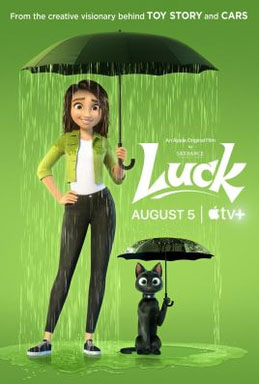 Luck (teaser trailer) is a 2022 computer-animated movie released on August 5 on the Apple TV+ streaming service. It's the first animated film from Skydance, to be followed by Spellbound.
Luck (teaser trailer) is a 2022 computer-animated movie released on August 5 on the Apple TV+ streaming service. It's the first animated film from Skydance, to be followed by Spellbound.
The story follows Sam, an extremely unlucky 18-year-old. After years in an orphanage and never being adopted, she moves into her first apartment. When she encounters a black cat, her luck suddenly changes, becoming good - and when it reverts to her previous bad luck, she follows the cat into the magical Land of Luck, the source of all luck in our world (both good and bad).
Most of the film revolves around Sam trying to regain luck - not for herself, but to help a younger girl at the orphanage - while a series of evasions and accidents escalate into circumstances that threaten the Land of Luck itself.
It's an ok film, with a really nice magical world, although the story has tons of holes if you think about it too much. Furry-wise, besides the cat, most of the characters are leprechauns. Here and there are some cartoony bunnies and pigs, plus a couple of other background creatures that you don't often see anthropomorphized (goats and root vegetables). And a large, pink, six-limbed dragoness, in charge of good luck. She's not in too many scenes, but she's definitely one of the highlights!
Interestingly, this film lacks a clear antagonist; most of the conflict is situational in nature. I wouldn't say this movie is a must-see, but it's fine to pass the time with, and I think it shows a lot of potential for what Skydance could make in the future, if they polish up their writing a bit.
(Spoilers and griping under this cut.)
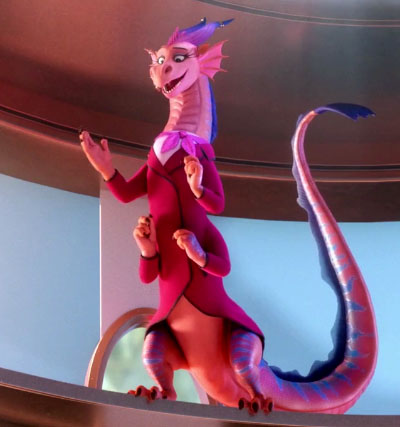
Production-wise, Skydance is a relatively recent production company who have been building up momentum. With Luck as their first animated feature, they picked up John Lasseter to co-produce it, previously of Pixar. The high point of his career was probably directing Toy Story in 1995 - after that... uhh... Cars? And after that he became an executive producer. At least, until the accusations of sexual misconduct, leaving the company, and having to lay low for a little while.
Writing-wise, the film tries to be very safe, with a committee-like feel to its overall tone. I was expecting obvious visual placement of Apple products, but no! So that was nice. The plot didn't quite follow story beats I would have expected either, that was a good surprise. Some explanations felt a little contrived, and one important plot detail was only foreshadowed fleetingly (I didn't even notice it, I had to go back and check). Someone almost goes evil, then doesn't. Wha?
Several people are credited with the film's concept, which was then given to three people to write. Two of them, Jonathan Aibel and Glenn Berge, had written Kung Fu Panda, Trolls, and The SpongeBob Movie. The third writer also did Luck's screenplay: Kiel Murray. She had been part of the story crew behind Raya and the Last Dragon, and did screenplay work for Cars. I'm glad to see more women getting work in the animation industry (despite people like Lasseter). And Luck's director was Peggy Holmes, whose previous work as a director includes a couple of Disney direct-to-video films.
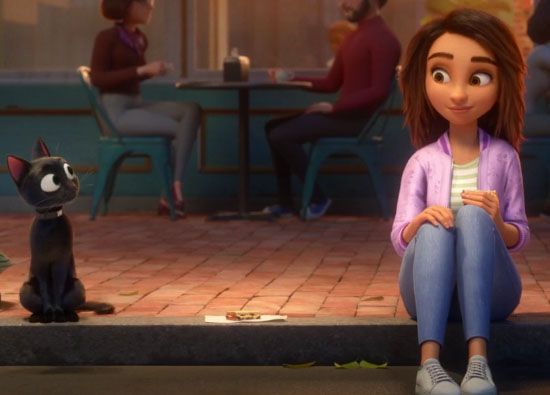
The music of the film is pretty unremarkable. For voice-acting, everyone did a decent job, with accents all over the place. Sam, the main character, was voiced by Eva Noblezada. The cat is Simon Pegg, the dragon is Jane Fonda, and Whoopi Goldberg is the leprechaun in charge of of security. For some reason I had a difficult time believing the characters were speaking in their own right (I kept thinking of them as voice actors speaking through the characters), until about 75% of the way into it, then suspension of disbelief kicked in. Weird, not sure what caused that. Maybe I was distracted by Sam's eyebrows, or because everyone's got really big eyes that don't blink enough? Seriously though, my brain's just odd like that. I think you'll be fine with the character designs! Well, not sure about the overweight unicorn, but at least he's in an open-minded relationship.
The story has a lot of unfortunate implications if you think about it. The Land of Luck is divided into two halves, good luck and bad luck. We don't spend much time in the bad half, but oh boy do things go wrong, constantly. In fact, at this rate I'm surprised that entire half of the world doesn't spontaneously burst into fire or explode. When Sam goes in, just by trying to get from point A to point B, she injures about ten people.
There are contradictory elements. On the one hand, luck is said to be distributed randomly, but in Sam's case it is definitely not random, it's outright cruel, and no explanation is ever given, nor sought for. (Bad luck attracts more bad, but by that argument, a large portion of the population should all be like Sam.) A pep talk during the film's lowest moment - "I was wrong to ever tell you not to try, because every time you do, you make things better" - is in direct opposition to everything that's happened.
In the Land of Luck, skill appears to be irrelevant. If you're lucky, you can do anything, recklessly, without a care in the world. Things automatically work out perfectly. Everyone's so happy, but can there truly be a sense of accomplishment, if you already know everything works in your favor, like throwing a ball through a hoop? What motivates the people in the bad luck half of the world to do anything? Is anyone actually in charge of bad luck production (besides that one guy)? We meet at least one character who's glad to have gotten out of there.
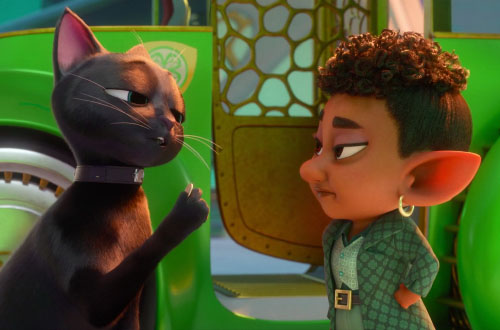
That being said, this film does a lot of positive messaging, that bad luck can bring people together, create friendships, build strength and resilience - I'm really happy they included this! (Another indirect lesson, carry lots of tools you can improvise with, and have two of everything, so when something breaks you'll have a backup.) Sam, also, is an exceptionally strong female character. She's obviously put up with a ton of bad luck and depression, but she goes on, she stands up, and she also has a strong sense of selflessness. Her priority isn't to get more luck for herself, but for another girl at the orphanage, so she won't have to go through the same hardships that Sam did. Good stuff.
Something I liked very much was the visual design. You can see the animation team was allowed to have a lot of creativity here. Much of the humor is physical and situational, with the way unexpected bad luck can manifest at almost any moment - the storyboarders obviously had a lot of fun with this, including the force of gravity! And there are little details in the world I noticed on going back to re-watch, like things to help smaller critters get around. A freeze-frame of one of the good luck security vehicles revealed a happy sign inside: "Lucky you! You've been arrested!"
For the furry characters, a lot of them looked alike. The bunnies were short and cartoony, with a comedic tendency to fall over. The pigs were rotund. The goats, we didn't get to see them much. The walking root vegetables were a change! And the dragoness had elements of both Eastern and Western design. Some characters had piercings. The black cat, the second main character - had his moments, but remained surprisingly stoic for most of the film, he didn't physically express much emotion until the end. He reminded me a bit of Jiji from Kiki's Delivery Service. I felt more invested in the cat in the computer game Stray, watching it walk around.
Finally, in terms of humor, there were a lot of visual gags that happened to the characters. I don't think there was much background humor going on. Still, a lot of the situational stuff felt rather contrived in terms of what the main characters were able to achieve without anyone noticing - it bordered on farce. If only the story writing could have been a bit more cohesive, the situations a little less idiotic... I wish the audience's intelligence had been given more respect, instead of taking a safe committee approach. I think this studio has a lot of potential! It's not a bad start, but we'll see if they challenge themselves in the future, or if they'll stick to one level of storytelling from here on out, like the Minions franchise has largely been doing.
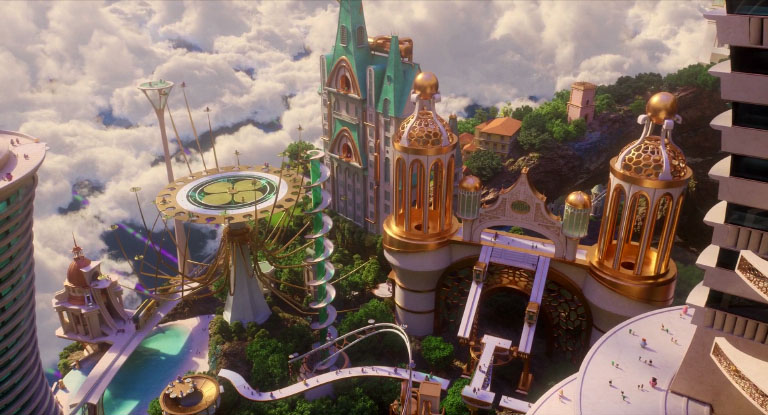

Comments
Interesting to see that you don't seem to spend any time on what was the only thing I'd heard about this film before now, the pushing of the corporate world into supernatural phenomena. Does the corporate side of things play a major role? Is it something that you noticed or it's just so worn into the storyline of children's films that it becomes unremarkable?
"But in most of the films directed by his imitators, all the talk of quotas and promotions and performance reviews seems like a lazy gimmick, and a pretty depressing one at that. As charming as these cartoons can be, their underlying message is that the best way to facilitate anything – birth, death, joy, Christmas presents – is to have hordes of diligent employees devoting themselves to one monolithic company."
https://www.theguardian.com/film/2022/aug/02/all-work-and-no-play-why-the-cartoo...
"If all mankind minus one, were of one opinion, and only one person were of the contrary opinion, mankind would be no more justified in silencing that one person, than he, if he had the power, would be justified in silencing mankind."
~John Stuart Mill~
Well, first off, a lot of the time I avoid reading any reviews before I write my own. With exceptions! Or occasionally I'll write the review, read other reviews before posting mine, and then either make small corrections or add observations, but when I do that, I keep almost all of my commentary intact, otherwise it would feel dishonest. In this case, I didn't read any reviews at all. The downside of that is I missed some details. Like, another reason the story probably suffered: actress Emma Thompson quit the project in protest over Lasseter being hired - and then a year later, director Alessandro Carloni quit too, citing "creative differences".
So now that I've looked up a review or two, I'm not seeing a lot of discussion about corporatism - but it's an excellent point. And it didn't even occur to me. Hey, new mental bias discovered! Woohoo! Which is odd, actually, because I lean left politically and am anti-large-corporate/monopoly. Welp, time for some personal background!
My parents definitely lean left, with mild activism. They'll go out and help a political candidate canvas the neighbourhood, that sort of thing. Or they'd go stand in front of a municipal building to protest, but that's pretty rare. My dad is a huge advocate for public transportation (especially trains), he was head of a group for that, and did a lot of letter-writing. Growing up with them, my sister and I both turned out left-wing as well, but without the activism. We vote; that's about it, and try to live by positive principles. My young nephew, not so much, he's right-wing, but it's his life, his choices.
My parents didn't push any big agenda on us with politics or religion, they let us ask questions and figure things out for ourselves, but of course there was some bias. I think the worst case was a tabletop board game called - I'm not kidding here - Class Struggle. I was young enough to know propaganda, and this wasn't my thing. It had about the same appeal as Monopoly, albeit with the addition of a square that could end the game in nuclear war. Anyway, although I was leftish, I didn't become a Marxist, activist, nor a railfan.
One thing I decided for myself was that I hated Disney. Sundays at home were the most boring days of the week, and there was nothing good on television all day. If there wasn't a hockey game (which I also didn't enjoy), Disney owned a good chunk of Sunday prime-time TV where I lived for something like 20 years. This was just as home video rental was coming in, and their strategy was to play bits of Disney classics, but never the full versions. Everything in the timeslot pushed other Disney products, it was insidious, along with an insistance of the MAGIC of Disney and Everybody Loves [insert Disney product here].
Even at a young age, I was thinking it wasn't entirely trustworthy for Disney to tell me how great Disney was. I was also really put off by the number of live-action Disney actors with blue eyes. I didn't know the concept of Aryanism yet, but damn, that was fucking creepy. Then as I realized how pervasive Disney products were, everywhere, that just solidified the distrust. Now, if anyone out there loves Disney and their products, that's fine, the world can be crappy, go to your happy place. I would never take the joys of The Lion King or Gargoyles away from my friends. The company's hugeness allows them to hire great talent, writers, and do stuff with high production values. But underneath all that, I wonder... what stories would we see if they weren't in control and had more competition? That's just one of the reasons why I don't like Disney, they're simply too big. Anyway don't bother arguing with me, this sort of thing is emotional and partially irrational and anyway it's not why I'm typing this extremely long response, but I thought you should have some context.
(Oh, I should say I do watch the occasional Disney thing, it's just very limited, and extremely random. I've got some massive gaps. Consequently I'm not that great at movie reviews, but pfff, not many other people are doing it on this site. Actually it's very unusual for me to have reviewed something as mainstream as Luck. But I've been so busy in the last year, I thought I should do something for a change.)
Right, so where were we... Corporatism as a theme in animated films. Excellent observation! So before I click that link you supplied, I'm going to try and think where I've seen that sort of thing before. (Thinks...) ...Actually this is pretty hard, I've never thought of animated films from that perspective. I'm going to look up some animated film lists. (Slightly later...) Ok, now let's look at the article, and see what it talks about. (Follows the link) Oh, it talks about some live-action stuff too. Well, here are the films they bring up. An asterisk (*) means I have not watched the film, and a check-mark (✔️) means the film was on my list too.
A Matter of Life and Death*, Beetlejuice*, Monsters Inc.✔️, Arthur Christmas✔️, Storks✔️, The Boss Baby*✔️, Soul*, Inside Out*, Coco*, Bee Movie*, Wreck-It Ralph✔️, and The Emoji Movie*.
Here are more from my list: Rise of the Guardians (the Tooth Fairy had some kind of organized franchise), Sing, The Lego Movie, Wonder Park*, Hotel Transylvania, Spirited Away, Big Fish and Begonia.
Not to disparage the commentary about Corporatism in that article - which is very much on point - there's a lot of variation. In Luck, The Lego Movie, Wreck-it-Ralph, and Big Fish and Begonia, the world is very much a job in of itself. In many of the others, it's a business enterprise set within a larger world, and we may (or may not) get to see the rest of the world it fits into (Monsters Inc and Spirited Away show us more of their worlds). Sing is a notable exception for being a business being run badly. And the story of Santa with a toy factory goes back decades. (By the way, Arthur Christmas is a highly underrated holiday movie, I definitely recommend it. And Big Fish and Begonia is a beautiful if extremely bittersweet Chinese animated film.)
So now that I look at it from that perspective, Luck's world - the good luck half, at least - is very weird. You don't see where people live or eat. It's not clear how many staff they have to manage the luck of several billion people on Earth. The dragon is their CEO. Someone else pointed out it feels like an ultra-clean "campus" like it was Google or Apple. The bad luck side seems to be an industrial hellscape, although they have a bar. That's the only non-corporate location we see.
As to why I didn't notice this theme, I don't know! I guess when one of these movies come out, I usually accept their universe at face value, and then examine the internal consistency and the implications it creates.
I also had an interesting discussion with a friend, who was immediately put off the film by my description. The story could have been so much more daring. What if Sam rejected the concept of luck entirely, and the privilege it gave people? For a similar example, look at the film Gattaca and the protagonist's quest to succeed, despite the dystopian society's insistence on biological determinism. Or look at - well actually, don't look, it's terrible - the Spanish animated film The Missing Lynx. The main lynx character is extremely unlucky, and during the climax he weaponizes it by yeeting himself onto the bad guy and clinging to him, causing him to run afoul of every single trap on the deadly obstacle course that's been set up.
So yeah, it's annoying to see more corporate culture as a plot point, and I wish they'd done something different and more challenging with the luck angle.
That was a long reply! Maybe even longer than the review and just for a small little question. Good to get another opinion on the topic though.
I watched The Missing Lynx, once, many years ago, but I honestly can't remember a thing about it.
One small comment (I don't all the films that you listed) but given some of the inclusions, I think you might have slightly misunderstood. It wasn't just that there are corporate aspects in the films but that they explain things like luck or emotions or babies as being the products of some supernatural corporation. So, from what I know of it, Sing wouldn't count because there's no supernatural aspect that I'm aware of.
I also wouldn't count Spirited Away as there isn't a corporate structure explaining something. There is the bathhouse but that is there purely to serve the spirits which have their own world and their own needs. It's like in Egypt you would bury the servants with the Pharaoh to provide services on the journey to the spirit world.
"If all mankind minus one, were of one opinion, and only one person were of the contrary opinion, mankind would be no more justified in silencing that one person, than he, if he had the power, would be justified in silencing mankind."
~John Stuart Mill~
On one hand, I totally get what Rakuen is saying here about Sing, because it's a story about a business that is actually a business in the real world. They're producing shows, not, like, the concept of music itself. I mean, some cartoon exaggeration and simplification aside, that's how they make plays and concerts and shows like that. It's called show business, after all.
But, I also get why dronon is listing it, which is the same as why I'm not a big fan of either movie, and that's because it just feels very corporate. The characters in the movie, even the nominal protagonist, the Matthew McConaughey koala, whatever he was called, Mr. Moon or something, are more interested in making a hit show than a good show, but worse than that, seem to conflate them. If Luck is about turning, well, luck into a product, the Sing movies are about turning art into product. The only difference is that the second one is something we do in real life, but whether or not we should is just not a question Sing or Sing 2 is interested in at all.
(Okay, also one both the article and dronon missed, Turbo; the snails eating food is treated as a punch clock job in the movie's opening.)
Gattaca rubbed me the wrong way, because you know, when the guy dies during a mission due to his latent issue, who's going to suffer? Everyone else on the mission. Plus all the people who pay for that rocket. It's not his capital he's putting at risk.
It had Uma Thurman being a social outcast at the company because she's not 'more superior' or something. I can't take the movie seriously enough to feel any capital was at risk other than the one spent on the movie's production. It's not an amazing movie, it's a pretty good one.
All I remember from that movie is the line "THERE IS MORE VODKA IN THIS PISS THAN THERE IS PISS!"
I really remember that line, though.
The idea, in the movie, that events are favorable or unfavorable not because of randomness, but because of a material force that is 'luck', that later shows to be distributed with a giant randomizer regardless... was ironic.
Post new comment